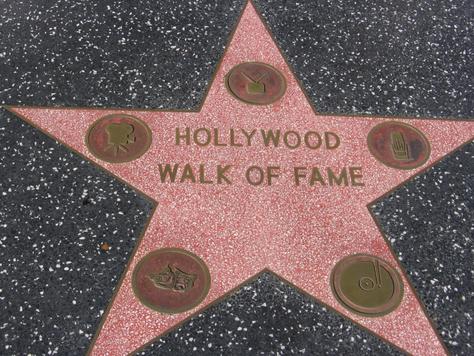 Unlike “real” scientists, social scientists have a hard life. They have no ironclad laws like entropy, decreeing single, motive forces for change — those big, one-way arrows saying, “like it or not, this is the direction we’re all going.” Sure, Toynbee had creativity and Weber had rationality, but they haven’t proved terribly useful for predicting the future.
Unlike “real” scientists, social scientists have a hard life. They have no ironclad laws like entropy, decreeing single, motive forces for change — those big, one-way arrows saying, “like it or not, this is the direction we’re all going.” Sure, Toynbee had creativity and Weber had rationality, but they haven’t proved terribly useful for predicting the future.
Nevertheless, like a crank reinventing relativity, I would now like to propose an ironclad Law of Marketing. I call it Celebrification. It’s a clunky word, but it’s all I have for now.
Celebrification has one simple prediction:
- Eventually, everything in the world will be marketed and sold by celebrities.
“Everything” doesn’t include only things — that is, products. I mean every service, every method, and even every idea will eventually be sold by celebrities of some kind or another. And this trend will continue until celebrities are peddling products and ideas about which they have no knowledge or competence, and we will buy them happily, regardless.
This isn’t a new phenomenon. Celebrities have always existed: Hollywood stars, authors, politicians, famous experts. And as long as they have existed, marketers have used them to hawk stuff. For example, well before succumbing to Alzheimer’s disease in his second term in office, Ronald Reagan sold Chesterfield cigarettes:
http://whitehouse.georgewbush.org/kids/reagan-chesterfield.asp
So this is nothing new. But now it’s far, far worse.
- Look at Dr. Phil: if a fat man can market a best-selling diet book, we have Celebrification. (And don’t forget Dr. Atkins, who may have died due to his own advice.)
- Look at Snooki: when a functional illiterate can market a how-to book, we have Celebrification.
- Look at Arnold Schwarzenegger: when a functional illiterate (in English; maybe he’s better in German) can become Governor of California, be consistently incompetent, and still get re-elected, we have Celebrification.
- Look at Paris Hilton: when a doltish woman can sell anything, we have Celebrification. QED.
It goes on and on. Suze Orman is the celebrity of financial planning. Dr. Oz is the celebrity of health. Oprah is the celebrity of celebrity itself — heck, I don’t even need to use her last name anymore. Does it matter whether these people know the most about their field, provide the best advice, or have the most effective impact on their audience? Not really — what matters is that they are well known, and that they can sell anything. And selling only keeps them longer in the public eye, reinforcing their own celebrity.
For the purposes of marketing, the Law of Celebrification leads to the follow corollaries:
- The First Corollary of Celebrification:
Every idea in the world will eventually be sold by celebrities.
That’s right, every single idea: not just health or wardrobe or self-help ideas, but political ideas, economic ideas, even religious ideas. The more famous the celebrity, the more likely we will accept the ideas they espouse as credible, perhaps even praise-worthy — even if they are illogical, harmful, or deliberately deceptive.
Why is gay marriage increasingly acceptable? Not, most likely, because we personally know gay people. It’s because we know and love gay celebrities, and they espouse the cause. I personally think it’s a good thing, but it’s a sword that cuts both ways.
Scientology is the other side of the coin. Scientology actually has a “Celebrity Centre” in Hollywood to manage the recruitment and cultivation of celebrities. Celebrities have been crucial to legitimizing a religion that, as most of us now know, is based on the idea that all your problems are caused by the souls of little aliens who were blown up in volcanoes on the earth 75 million years ago by the galactic meanie Xenu. Ridiculous? Yes, as ridiculous as most every religion. But Scientology seems legitimate due to Tom Cruise, John Travolta, and … some other B-listers I’m too lazy to look up.
Likewise, the Beatles legitimized the Rolls Royce-collecting Maharishi Mahesh Yogi. Richard Gere legitimized ultra-superstitious Tibetan Buddhism. Shirley MacLaine legitimized occultism. Is this a good thing? It doesn’t matter. It’s Celebrification — it’s here, and it’s not going away.
- The Second Corollary of Celebrification:
The power of celebrity is irresistible and unavoidable.
I have a number of smart friends who don’t want to believe that Celebrification is everywhere. They want to be professional writers, coaches, experts, or other idea workers, and they look to their (celebrity) heroes for guidance. They say, “my hero didn’t have to do that, and s/he became famous.”
They think, to be a successful writer, I just need an MFA, an agent, a publisher, and maybe some talent.
They think, to be a coach, I have to spend 10 years working with people, to build up my expertise and book of business.
They think, to be an expert, I need to test and prove my methodologies. I will write papers, and people will find them, and I’ll become credible that way.
This is BS. This is denial.
Maybe that process worked 20 or 30 years ago. It doesn’t work today. Celebrities come up faster than ever, swamping whole fields and sucking all the air out of entire categories. Your success depends on your ability to acknowledge this fact, and to take advantage of it.
And this leads to the next corollary:
- The Third Corollary of Celebrification:
To sell anything, you must become a celebrity yourself.
I know many people who hate this fact. They say, “I don’t want to become famous. I value my privacy. I just want to sell my [products/services/ideas], and let them speak for themselves.”
This is admirable. In a world of Celebrification, however, it is also foolish. Staying underground is the sure path to remain poor and unsuccessful.
I love good products. But most people can’t tell the difference between a good product and a bad product, and they certainly can’t tell before they buy and use the product themselves. So they go with what’s sold by somebody they know, and in this increasingly atomized world, all we know are celebrities.
Even today, with a plethora of product reviews, people still buy stuff that doesn’t work sold by celebrities who don’t know jack. Why? Because a celebrity brought it to our attention, and they transferred some of their appealing familiarity to an unfamiliar product.
Even when we don’t believe in the inherent credibility of the celebrity, we think: “This product must have been so good that they had enough money to pay for a celebrity to endorse it. So they must be doing something right. Right?” Well, no. That celebrity may have fallen on hard times, or be getting a commission on every sale, minimizing risk for the seller. But that really doesn’t matter, as long as the masses keep buying.
In the world of Celebrification, staying unknown is not an option. Those who eschew celebrity will fall by the wayside, only to have their product or solution or idea peddled by less competent but much more famous people.
True story: I knew an amazing chocolatier. His fine chocolates were made by hand, and were top notch. He had a beautiful store with its own factory, and distributed product nationwide. He loved showing off his product and explaining how he created it on factory tours. He easily connected with people, and he sold lots of product when people knew him personally.
But he categorically refused to seek fame. I told him it was necessary — that other chocolatiers like Michael Recchiuti, Christopher Elbow, or Jacques Torres would come along and eat his lunch. I even pointed to the Max Brenner Chocolate Shop — a famous chocolate-themed store in New York City that promoted a completely fictional person as its celebrity. (There is no Max Brenner — he’s the invention of a clever Israeli company.) When people can’t tell good chocolate from bad chocolate, and most people can’t (viz. Godiva), fame and celebrity is the quickest and fastest way for people to get the reassurance that what they are buying is good.
Today his business is bankrupt. I may never taste another one of his Passion Fruit Hearts. His Peanut Butterflies have gone extinct. The world’s culinary biodiversity is diminished.
But the essence of the problem was marketing: he was never able to sell on the scale required to justify his considerable production expenses. And he never made that leap, in my opinion, because he refused to sell himself nationwide. At every step of the way, he resisted PR about himself as a celebrity. He thought it was modesty. He thought it was putting his chocolates first. He was wrong: celebrity sells chocolate, just like it sells food, and just like it sells everything else.
In summary: Ignore the power of Celebrification at your peril. You must become famous to sell your product, and your increasing fame will only legitimize the value what you sell.
So how do you become famous?
- The Fourth Corollary of Celebrification:
To be a celebrity, make people think you’re number one in your space.
(And if you’re not number one, define a new space.)
The difficulty of being a celebrity is how to become one. Luckily, this is a classic problem that has been dealt with in the world of branding.
Most people only have room in their heads for one or two “most famous” people of a certain type at a time, and most of the benefit accrues to the Number One most famous celebrity in a category.
Here’s my invented rule of thumb: The Number One celebrity will get 80 percent of mindshare. Number Two will get 20 percent, if they are lucky. Everybody else, including you, split up the remainder — typically less than 5 percent.
If you’re in that remainder, it’s time to find a new space. Add a new modifier to your description. Too many style mavens? Become a style maven for redheads! Whatever you do, find a unique title you can bestow on yourself, and fake it until you make it. By which I mean, fight tooth and nail to get yourself out there and in front of people’s eyes, and to establish a recognizable brand for the public.
It’s all here in my post: How to Become Famous.
Anyway, I’ve gone on long enough. Here are my conclusions in a nutshell:
- Nowadays, celebrities sell everything — products, services, and even ideas.
- You may not like it, but this is only going to get worse with time.
- You can’t beat them, so you might as well join them.
- You can join them, with persistence and cunning. Again, see How to Become Famous.
Good luck! See you in Variety!

